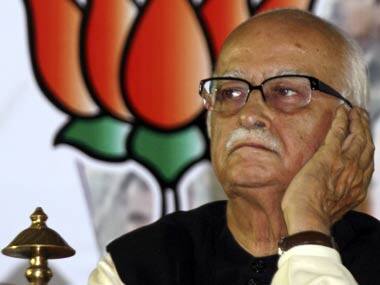On Sunday night, an ‘ailing’ LK Advani was visited by RSS general secretary Bhaiyaji Joshi, who was apparently a man on a mission. Joshi “pulled up” Advani for his aggressive stance against the party decision to elevate Narendra Modi. Advani was also told to “rise above his personal ambitions and think of the party”. The next day, LK Advani resigned from the three posts he held within the BJP. CNN-IBN reported that the “real reason” that Advani is upset is because of Rajnath Singh and two RSS pointpersons in the party, Suresh Soni and Ram Lal. The infuriated party leader blames these three for pushing the Modi agenda without taking a consensus. “The sum and substance of of his rebellion today is his objection to Rajnath’s deference being to RSS than towards him,” said a senior party functionary to The Indian Express today. Why Advani expected deference from Rajnath, who has always been an RSS-loyalist, is hard to say. But to expect it from the RSS, a party with which he has had a strained relationship for years, is a mystery. [caption id=“attachment_861361” align=“alignleft” width=“380”]  The relations between Advani and the Sangh have been deteriorating. Reuters[/caption] RSS emissaries are expected to visit Advani today. But the rift with Advani and the party he helped build has been traced to the deep problems the leader has had with the RSS in the past. The last time RSS had pulled the reins on Advani’s prime ministerial aspirations was during his Jan Chetana Yatra in October 2011. While his “rathyatras” have been given much credit for helping build the party’s credibility, this particular yatra was interpreted by the RSS as an attempt to position himself for the country’s top job. It was on September 21, 2011, that Advani visited Nagpur in order to enlist the help of RSS Sarsangachalak Mohan Bhagwat. But it was two meetings too late – Bhagwat had already met with then-BJP president Nitin Gadkari. A week before, another meeting between the RSS top brass had all leaders agreeing on one point: Advani had to step aside for someone younger. Bhagwat gave Advani a piece of advice which has since then become cacophonous throughout the ranks of the BJP – Advani should pass on the mantle to younger leaders and assume the mentorship role that his age deserved. Support for the yatra was given only on one condition – Advani give up any aspirations he had for being prime minister. His last shot, in the 2009 elections, had missed by a wide mark. A subdued Advani was then forced to eat crow and tell the media that he had no personal aspirations for a prime minister nomination. “I became a swayamsevak at the age of 14, then a member of the Jan Sangh and then the BJP. What I got from these organisations in my political career of 55 years and from my fellow workers is much more than the PM’s post,” he had said. But of course, the problems with the RSS have run deeper. Advani’s comments on Jinnah’s secularism in 2005 drew sharp criticism from the party, who sent their senior man Sanjay Joshi to the Delhi airport to demand that Advani withdraw his comments. Advani had resigned then as well, and even though he withdrew it in four days, his equation with the RSS never recovered. Advani went on to resign seven months later on December 31, 2005. The clashes with the RSS have been routine ever since. Advani had in the past also ensured that Nitin Gadkari, an RSS choice, did not get a second term as party president. Even now, the RSS is staying firm in its support of Modi. The BJP is dodging the increasingly loud allegations of a rift with RSS (“The Sangh has not said anything like that. What is being said about the Sangh is not correct," BJP president Rajnath Singh said this morning). But the rift is undeniable, and the BJP’s carefully-maintained façade of unity is publicly crumbling.
LK Advani’s flurry of resignations are being attributed to a rift with the RSS. But this is just the latest example of a long-strained relationship between the party and the octogenarian
Advertisement
End of Article


)
)
)
)
)
)
)
)
)



